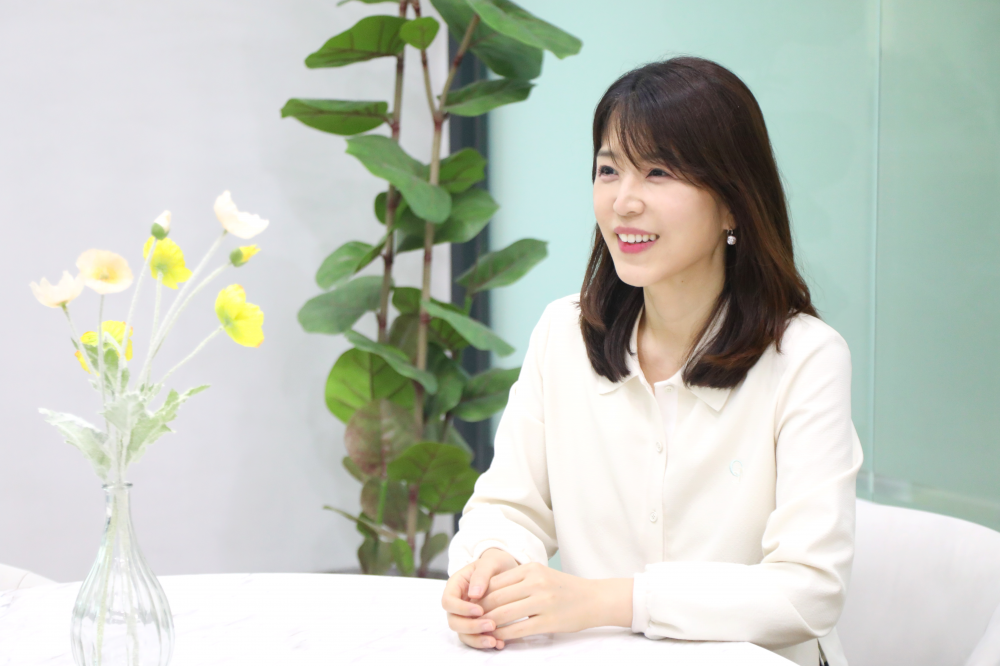News
KUBS News
“I Prefer Wrong Answers” – Why Professor Minjung Kim’s Class Is Special

Professor Minjung Kim, recipient of the 2024 Fall Semester Seok-Top Excellence in Teaching Award, is a faculty member specializing in Business Strategy, Technological Innovation, and Global Strategy. She teaches “International Business” and “Strategic Management,” leading courses that emphasize critical thinking and open communication. After earning her undergraduate and master’s degrees at Korea University, Professor Kim obtained her Ph.D. overseas and taught abroad before returning to her alma mater. In her very first semester back, she was met with enthusiastic praise from students, ultimately earning her this distinguished award. With her classes characterized by rigorous discussions, sincere attention to each individual student, and a strong focus on critical thinking, Professor Kim’s teaching goes far beyond simple knowledge transmission—creating an environment that fosters student growth and development. The KU Business Journal sat down with Professor Minjung Kim to hear about her educational philosophy, what shapes her classes, and her vision for the future.
Q1. Please briefly introduce yourself.
A1. I’m Professor Minjung Kim, with a focus on Business Strategy, Technological Innovation, and Global Strategy. At the moment, I teach “International Business” and “Strategic Management.”
Q2. How did you feel about receiving the Seok-Top Excellence in Teaching Award?
A2. I was truly surprised and delighted to receive this award for the very first semester I taught after returning to my alma mater. I still vividly remember taking classes in LG-POSCO Hall as a student, and now, being able to teach in that same place feels incredibly special and meaningful.
I’m sincerely grateful to the students for their positive feedback, which made this recognition possible. I often reflect on the inspiring guidance I received from my professors during my undergraduate and master’s years, and I teach with the hope of becoming a professor who can have the same kind of positive impact on my students.
Q3. What do you value most in your teaching?
A3. I place great importance on cultivating students’ critical and logical thinking. Rather than simply memorizing facts, I encourage them to ask questions like “Why is that?” or “Is there another perspective?” My classes are discussion-oriented, where students are encouraged to exchange diverse viewpoints. I believe this process helps them develop the kind of thinking that can be applied meaningfully in real-world contexts.
Q4. Is there anything you pay particular attention to when communicating with students?
A4. I make a conscious effort to remain approachable so that students feel comfortable coming to me without hesitation. I often tell them, “I actually prefer wrong answers,” because an incorrect answer doesn’t necessarily mean the thinking behind it is wrong. By sharing different perspectives and refining our ideas together, we often arrive at a much deeper understanding. I’m grateful that students seem to respond positively to this approach.
Q5. Do you have a memorable class or student?
A5. One student once shared that when they opened their textbook to prepare for an exam, they were surprised to find that they already understood most of the material. That truly made me happy, as it meant the class itself had already helped them internalize the content. Another student started a small bungeoppang (fish-shaped pastry) business and, out of respect for local vendors, chose to open only after 9 p.m. I was so impressed by their sense of initiative and responsibility that I went out at that hour to cheer them on. Later, the student sent me a message saying they were touched by how close they felt to a professor. That experience reminded me how important it is to stay connected with students and to create more opportunities to support and encourage them up close.
Q6. Do you have any personal know-how when it comes to preparing lectures or conducting classes?
A6. I place great emphasis on ensuring students truly understand the material. I constantly try to anticipate where they might struggle and design my lectures to address those points. Since not all students are comfortable asking questions, I proactively clarify concepts that may be confusing. I also continuously refine my teaching materials to better support this approach.
Q7. Do you have any advice for students outside of class?
A7. These days, many students tend to pursue safe paths in the face of uncertainty and competition. But I encourage them to take on challenges—even the smallest ones. Small steps in everyday life can lead to meaningful discoveries about what they truly enjoy and where their strengths lie. Rather than fearing failure, I hope they cherish the learning and growth that come from the process.
Q8. What are your goals for future research and teaching?
A8. Although I’m now in my fifth year as a professor, I still consider myself a learner—continuously working to create better and more engaging classes. I’m committed to contributing through both teaching and research to help Korea University students become globally minded leaders.
In terms of research, while I’ve mainly focused on U.S.-based cases so far, I plan to shift my attention toward exploring concrete strategies that can strengthen innovation performance among Korean companies.
Q9. Finally, do you have any words for readers of The Business Review and members of the Business School?
A9. Korea University holds a truly special place in my heart. Even while I was pursuing my Ph.D. and teaching at other institutions, the strong sense of connection and community at KU never left me. Since returning, I’ve come to appreciate that even more deeply. I hope to continue growing—as both a professor and a proud alum—so that I can give back meaningfully to this remarkable community.


